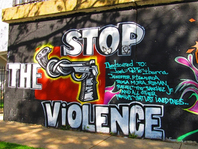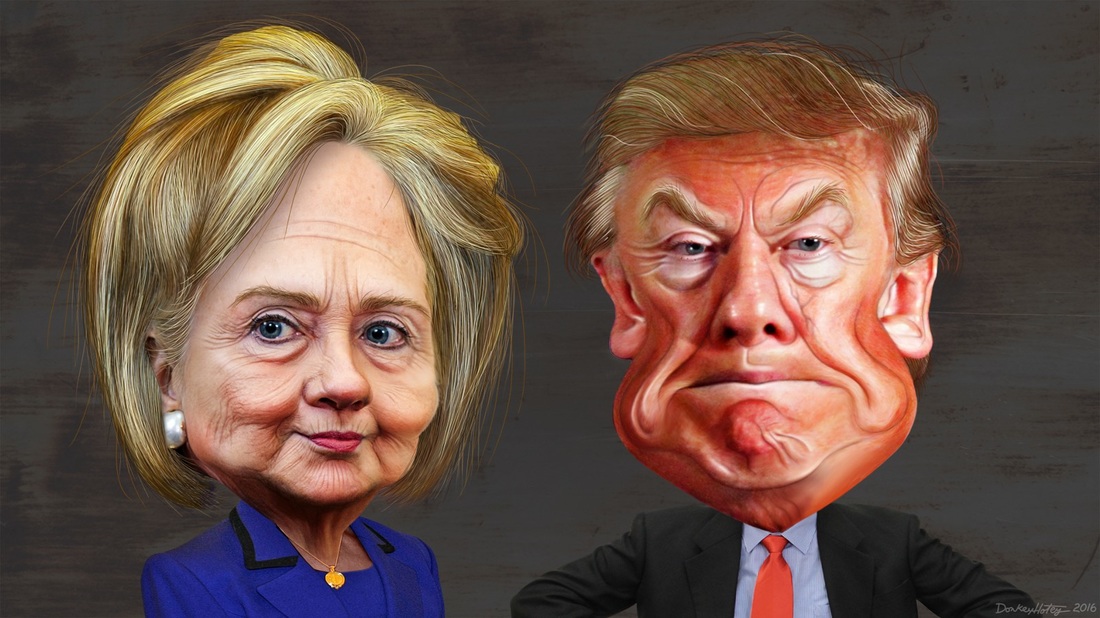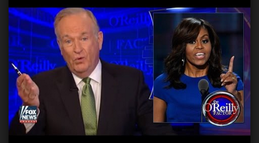 by Russell Johnson It’s only August, but we already know who TIME Magazine’s Person of the Year will be. It’s not Simone Biles, it’s not Elon Musk, and it’s not Pikachu. No, in 2016 no one has been in America’s spotlight more than Donald Trump, and it’s not even close. He has been protested, praised, scrutinized, reviled, endorsed, criticized, quoted, and parodied more than anyone. He is the tap on the knee to which everyone immediately reacts. If 2016 were a novel, Trump would be the main character, and every other character would take their place in relation to him. It’s hard to overstate the widespread obsession with Trump which has captured the imagination of pundits, news media, and bloggers, especially those on the left. The pull is hard to escape—there’s just so much to say about him. There are so many things to criticize; scholars, artists, and comedians are relishing in the opportunity to unload their full critical arsenal. Finally there is a villain deserving our smug liberal heroics. So we enlist in the war of everyone versus Trump. And as so often happens in wartime, we violate the very principles for which we fight. Some of the casualties of 2016 have been objectivity, charitable interpretation, tolerance, a cooperative approach to governance, and even basic respect.
1 Comment
 [ While there's no need to have read my previous post to read this one, folks who have will recognize that this is the second of two posts in response to the claim that the best strategy to end violence on the south and west sides of Chicago is the spread of the gospel through evangelism. -David] If we are going to think about evangelism as a strategy to fix the problem of violence in Chicago, it makes sense to begin with the question: is a lack of knowledge of the gospel the cause of the shootings among young black men in Chicago? Well, it’s certainly clear that the absence of Christianity cannot cause shootings in the way we talk about one billiard ball causing another ball to move. It cannot be simple cause and effect. If it were, all non-Christians would be shooting people all the time. It would be hard to explain how, for example, Japan is only 2% Christian but has one of the lowest murder rates in the world.  by Russell Johnson Clint Eastwood was in the news this week, not for remaking Denzel Washington’s “Flight,” but for some comments he grumbled angrily during an interview with Esquire. When asked about Donald Trump in an interview, Eastwood said, “He’s onto something, because secretly everybody’s getting tired of political correctness, kissing up. That’s the kiss-ass generation we’re in right now. We’re really in a p**** generation. Everybody’s walking on eggshells. We see people accusing people of being racist and all kinds of stuff. When I grew up, those things weren’t called racist.”  I recently heard a Christian speaker talk about violence in Chicago. According to him, the answer to the problems plaguing the south and west sides of the city is simple: these communities need to embrace the Gospel. This is not an unusual way for Christians to think, of course, and it might seem to flow from some of the central tenets of the faith. Becoming Christian should make people better, right? If enough people are transformed, that should make neighborhoods better, too. Plus, we look around our churches and see a bunch of (mostly) nice, smiling people who seem unlikely to commit murder. It is only reasonable, then, to think that if we could only bring enough of our neighbors into the Church and into faith, then a host of societal problems would be solved. While I understand the temptation to think this way, I'm increasingly convinced that this is not how Christians should think and talk about social problems.  (Photo: DonkeyHotey) (Photo: DonkeyHotey) Welcome to our first ever FTSOA chat! What follows is a free-flowing discussion between Russell, David, and Mike Lehmann, a Republican political operative with a Duke Divinity School degree and friend of the program. This conversation has been slightly edited for clarity. DAVID: I hear lots of people talking about the choice between Trump and Clinton as picking between “the lesser of two evils” and many seem conflicted about doing that. But what is the moral significance of voting for an objectionable presidential candidate? Are you morally on the hook for the candidate’s full slate of positions? Should your conscience hold you back?  This election, Americans are choosing between two incredibly unpopular candidates. According to surveys, both Hillary Clinton and Donald Trump have 37% approval ratings. To put that in Rotten Tomatoes terms, they both have the same approval rating as “Bicentennial Man” and “Scary Movie 4” (and, perhaps ominously, “The Purge.”) Americans, by and large, are not thrilled to vote for the two people who have a legitimate chance at winning. The primary process of the two major parties has left us feeling at a loss. We’d rather vote for someone else—ideally Terry Crews, but frankly at this point we’d settle. So we turn our attention to Jill Stein and Gary Johnson, who like many third party candidates before them are fully prepared to suggest sweeping-but-impractical-sounding reforms to take advantage of our disappointment in the Republicans and Democrats. They have to overcome two hurdles—first, convincing voters that they’re well-qualified to be president, and second, convincing those same voters that a third party vote isn't “throwing away your vote.” Even in an electoral year like this one, when the two major candidates have worse approval ratings than Comcast and Time Warner Cable, third party candidates may be able to overcome the quality hurdle but not the viability hurdle. Let’s think for a second about why.  Michelle Obama mentioned in her DNC speech that the White House was built by slaves. Bill O’Reilly then announced on his show that he had looked it up and reassured his viewers that the "slaves that worked there were well fed and had decent lodgings provided by the government, which stopped hiring slave labor in 1802.” People were justifiably angry with O’Reilly over this. It came across like he was saying, “Yeah, ok, I admit the U.S. government used slaves in the past, but it wasn’t that bad and we stopped doing it right away. We can all keep our faith in America’s moral purity.” His comment and the backlash got me thinking about the defensiveness on all sides here. O’Reilly and others of his ilk have very little patience for criticism of America’s past greatness, what they call “revisionist” history. Since America is clearly great, to point out its foibles and imperfections is to obscure the issue, when (to them) America's greatness is clear. Likewise, folks who think slavery and its legacy are a really big deal have very little patience for people pointing out the times it wasn’t so bad. Since slavery was clearly an abomination, to bring up mitigating examples of humane treatment of slaves is (to them) to obscure the verdict of history.  Earlier this week, Wayne Grudem endorsed Donald Trump. You may be thinking, “Big deal. I bet a lot of people named Wayne endorsed Donald Trump.” But Wayne Grudem is different. He’s the author of the systematic theology book used by more evangelical seminaries than any other. It’s currently listed as the #1 bestselling Protestant theology book on Amazon.com, and the #1 bestselling systematic theology book. Grudem has been influential among evangelicals for decades now; his writing and teaching form the intellectual backbone of many pastors’ and writers’ theologies. His article, “Why Voting for Donald Trump Is a Morally Good Choice” feels to many of my fellow evangelicals as a betrayal. Though it was scarcely surprising that public evangelicals like Jerry Falwell Jr. and Franklin Graham—whose names are bigger than their influence—supported Trump, it hurts to see |
Archives
September 2020
Categories
All
|

 RSS Feed
RSS Feed